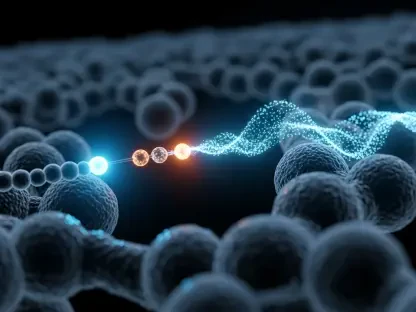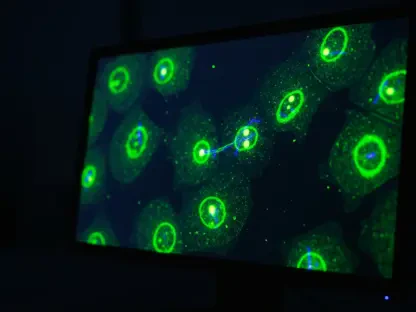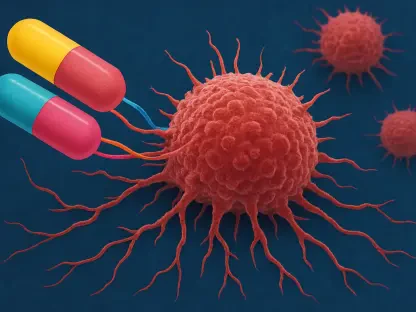Cancer treatment, long considered a formidable challenge, has seen significant advancements with the collaboration of engineering and biomedical sciences. The Cancer Bioengineering Collaborative represents a milestone in merging these disciplines to revolutionize cancer diagnosis, monitoring, and treatment. This initiative, a joint effort between Rice University and The University of Texas MD Anderson Cancer Center, aims to craft innovative diagnostic and therapeutic tools to combat cancer effectively. The recent seminar marked the beginning of this ambitious journey, showcasing cutting-edge research and offering a glimpse into the future of cancer care.
Pioneering Contributions in Cancer Immunotherapy
James P. Allison’s Legacy and Innovations
James P. Allison, a Nobel laureate renowned for breakthroughs in cancer immunotherapy, played a central role in the seminar as the keynote speaker. His groundbreaking work on T cells and immune checkpoint blockade therapy has transformed cancer treatment methodologies. Allison’s journey into immunotherapy began in the early 1980s when he explored the function of T cells, the body’s primary defense mechanism against disease. His research culminated in the development of ipilimumab, a drug that inhibits CTLA-4, a protein that hinders T cells from identifying and attacking cancer cells. This innovation has been pivotal in removing the immune system’s inhibitory “brakes,” allowing for enhanced T cell targeting of tumors and fostering long-term immunity.
The effectiveness of Allison’s research is exemplified by real-world success stories, such as that of Sharon Belvin, a metastatic melanoma survivor who achieved complete remission after a single treatment round. These narratives underscore the transformative potential of immunotherapy in offering enduring cancer care solutions. Yet, the work is far from done. Allison acknowledges that immune checkpoint blockade therapy is effective in only about 20 percent of patients, highlighting the need for continuous research to widen its applicability. Current efforts focus on understanding complex interactions within the immune system, aiming to improve patient response rates and address resistant cancer types such as pancreatic cancer and glioblastoma.
Improving Immunotherapy Through Collaborative Research
The path forward in immunotherapy involves exploring combination therapies that integrate multiple checkpoint inhibitors and other treatment modalities. Combining surgical interventions with immunotherapy or tailoring treatments to individual tumor biology offers exciting new possibilities. The seminar emphasized identifying immune cell markers, like ICOS, which can predict how well a patient might respond to immunotherapy. Such advancements could allow clinicians to customize therapies more accurately, increasing their effectiveness and minimizing side effects. Combining these strategies with insights from engineering principles could lead to the creation of smarter, more adaptive cancer treatment protocols.
Curiosity-driven science holds the promise of monumental changes, a sentiment echoed by Allison throughout his presentation. His ongoing efforts at the Allison Institute focus on small-scale, mechanistic trials designed to unravel why certain treatments succeed. These trials aim to yield not merely observational data but profound understanding, fostering the creation of more intelligent therapeutic strategies. The seminar not only spotlighted the achievements of figures like Allison but also demonstrated the collective ambition within the scientific community to push the boundaries of cancer treatment. The initiative’s spirit, characterized by collaborative synergy and shared expertise, underscores the pivotal role of interdisciplinary efforts in advancing cancer care.
The Role of Engineering in Cancer Treatment
Contributions From Bioengineering and Technological Advances
Engineering is critical in translating biomedical research into practical cancer treatments and diagnostics. Mechanical and electrical engineering innovations provide tools and methodologies that enhance the precision and effectiveness of cancer therapies. By developing sophisticated imaging technologies, engineers help facilitate early and accurate cancer diagnosis, crucial for successful treatment outcomes. The collaboration between bioengineering and oncology can lead to the creation of more efficient drug delivery systems, ensuring targeted treatment and reducing damage to surrounding healthy tissues.
Additionally, engineers design and develop devices that assist in monitoring tumor responses or relapses post-treatment, equipping medical professionals with real-time data to make informed decisions. Advanced algorithms and machine learning techniques are also employed to analyze vast sets of biological data, aiding in identifying patterns that could predict cancer progression or patient responses. This data-driven approach enables researchers to refine treatment protocols continuously, addressing individual patient needs and enhancing the overall quality of care provided.
Integration of Bioengineering in Clinical Practices
Incorporating engineering insights into clinical practice involves overcoming several challenges, including ensuring compatibility with existing medical systems and regulations. Effective integration requires collaboration between engineers and healthcare providers to refine technologies that align with clinical needs and operational frameworks. The seminar highlighted the importance of fostering environments where diverse expertise can converge, ensuring that novel engineering solutions are both feasible and beneficial within real-world medical contexts.
Such integrated initiatives not only advance current treatment modalities but also pave the way for next-generation therapies. Developing personalized medical devices, leveraging nanoscale engineering for targeted drug delivery, and using advanced sensors for monitoring physiological changes all represent areas where engineering can make a significant impact. These innovations have the potential to make cancer treatments more efficient, minimizing side effects, and improving patient quality of life. Continuing to break down traditional silos between disciplines will be essential in ushering in a new era of personalized, precise cancer care.
Towards a New Era in Cancer Treatment
For a long time, tackling cancer treatment seemed daunting, yet notable progress has emerged through the fusion of engineering with biomedical sciences. The Cancer Bioengineering Collaborative stands as a significant breakthrough by merging these domains, poised to transform cancer diagnosis, monitoring, and treatment. Spearheaded by Rice University and The University of Texas MD Anderson Cancer Center, this initiative is set to develop groundbreaking diagnostic and therapeutic strategies to tackle cancer more effectively. The seminar heralded the inception of this ambitious endeavor, featuring state-of-the-art research and insights into forthcoming advancements in cancer care. It signifies the drive to harness interdisciplinary talent and technology, promising a future where cancer treatment is more targeted, personalized, and efficient. By integrating innovative techniques and methodologies, this collaboration aims to improve patient outcomes, ensuring more precise and timely interventions in the battle against cancer.









